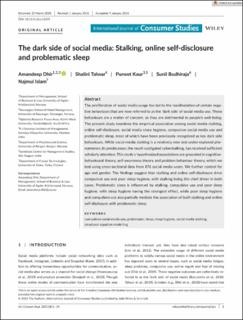The dark side of social media: Stalking, online self-disclosure and problematic sleep
Peer reviewed, Journal article
Published version
Permanent lenke
https://hdl.handle.net/11250/2788424Utgivelsesdato
2021-02Metadata
Vis full innførselSamlinger
Originalversjon
Dhir, A., Talwar, S., Kaur, P. et al. (2021) The dark side of social media: Stalking, online self-disclosure and problematic sleep. International Journal of Consumer Studies 10.1111/ijcs.12659Sammendrag
The proliferation of social media usage has led to the manifestation of certain negative behaviours that are now referred to as the ‘dark side’ of social media use. These behaviours are a matter of concern, as they are detrimental to people's well-being. The present study examines the empirical association among social media stalking, online self-disclosure, social media sleep hygiene, compulsive social media use and problematic sleep, most of which have been previously recognized as key dark side behaviours. While social media stalking is a relatively new and under-explored phenomenon, its predecessor, the much-castigated cyberstalking, has received sufficient scholarly attention. This study's hypothesized associations are grounded in cognitive-behavioural theory, self-awareness theory and problem behaviour theory, which we test using cross-sectional data from 876 social media users. We further control for age and gender. The findings suggest that stalking and online self-disclosure drive compulsive use and poor sleep hygiene, with stalking being the chief driver in both cases. Problematic sleep is influenced by stalking, compulsive use and poor sleep hygiene, with sleep hygiene having the strongest effect, while poor sleep hygiene and compulsive use also partially mediate the association of both stalking and online self-disclosure with problematic sleep.

